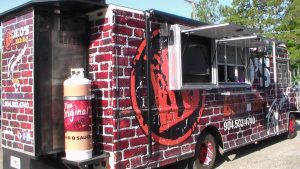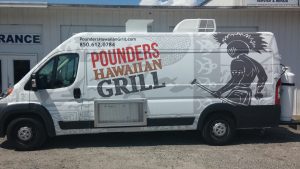In recent years, we’ve seen an increase in the number of food trucks selling a wide range of dishes. Their popularity puts them on the frontline of the street food industry with customers enjoying hamburgers, sandwiches, ice cream, regional delicacies, and even gourmet cuisine.
Just like restaurant owners, people behind food trucks have a lot on their plate to make sure that they can operate seamlessly. Aside from keeping supplies under control, marketing products, and training the employees, another aspect of the business to consider is preparedness for natural disasters such as hurricanes.

Is Your Food Truck Protected From Severe Weather?
Did you know that between 1980 and 2019 the overall cost of damages due to extreme weather in the United States reached roughly $1.6 trillion? Hurricanes affect a lot of people, and those who are working in the restaurant and food truck industry are no exception. Every year, food truck and restaurant owners face damage to or loss of properties because of natural disasters. It can be challenging to deal with a hurricane, especially for a business such as a food truck where owners rely heavily on regular operations. If they lose assets such as products, or if their trucks sustain damages from a hurricane, it could translate to substantial financial losses or even a permanent business shutdown.
Technological advancements pave the way for us to know when a hurricane will hit and in which areas. As a food truck owner, it’s not enough to have this information. There are several measures that you can do to reduce the impact of a hurricane on your business.
So what do you need to do to be ready for hurricane season? Here are some tips to take into account:
Set up a comprehensive emergency and response plan.
It doesn’t matter whether or not a hurricane is going to hit the area where you operate: it’s crucial to have an emergency and response plan in place. Safety is, and should be, a priority and everyone involved in the food truck business should know and understand the plan in case a disaster strikes.
An emergency and response plan covers the measures to implement before, during, and after a hurricane. Facilitate drills regularly so that everyone knows the steps to take in times of crisis. The last thing that you want is to deal with panic and confusion in an emergency. Inform your staff about safety guidelines, and display relevant phone numbers and contact information for smooth coordination and communication. To complement the response plan, the food truck should also have a fire extinguisher and other safety tools and equipment required by the state.
See what your state offers during hurricane season.
Take advantage of the benefits are being offered by your state in case of a natural disaster. Most, if not all, states allocate funds to help those who are affected by a hurricane. Safety precautions and guidelines are also implemented, so make sure to adhere to them. You can likewise see if the state provides benefits for employees to reduce the impact of a hurricane in their jobs. Make sure to prepare the necessary documents as soon as possible to make the process easier.
It is also essential to always check the weather forecasts or bulletins. Watch the local news or check news sites online to stay updated.

Protect Your Investment with the Right Insurance.
Purchase insurance.
One of the best ways to ensure the safety of your staff and the food truck is to carry insurance that meets the requirements of your business. Running a food truck may be considered a small business and insurance may look like an additional cost, but it’s a wise investment that will protect you from spending a lot of money on claims associated with bodily injury or damage to property. In case of a hurricane or a natural disaster, the insurance will make sure that your food truck business will still be able to operate as the coverage will take care of the damages.
Many insurance providers offer a wide array of insurance products, addressing different needs of a food truck business. With so many options available, it may be challenging to find the right coverage. To help with the selection process, make sure to identify the potential risks including natural disasters. Once you know what you’re up against, you can look at the various types of insurance:
- Commercial Flood insurance – Do you operate in a flood-prone area? It is imperative to carry Commercial Flood insurance. As the name suggests, this type of coverage protects your business against significant financial losses as a result of damages to business assets due to flooding. These physical assets include your products, equipment, records, and tools. This is an important type of policy to have because other policies will not cover any damages due to flood water.
- Commercial Property insurance – Natural disasters such as hurricanes can cause damage to your physical business assets including office building, tools, supplies, and office equipment. If that happens, you can count on Commercial Property insurance, so you don’t have to shell out money for repair or replacement. However, this insurance does not cover company vehicles. Check out Commercial Auto insurance if you want to have coverage for the vehicles used in operations.
- Business Interruption insurance – Just like a restaurant, a food truck business needs to operate regularly to become profitable. If it’s closed because of a hurricane, there’s no income. In times of crisis, you may not know when your food truck can resume operations. That’s why it is essential to carry Business Interruption insurance that will protect you from losing a lot of money due to lack of operations as it will take care of the lost revenue.
Keep these tips in mind to prepare for natural disasters. When running a food truck business safety should be a top priority, more so during hurricane season. Be prepared to ensure not only the security of your staff and property but also business continuity. Natural disasters such as hurricanes can have a significant impact on your operations, and they can strike anywhere, but there are ways to minimize the impact and ensure that your business can bounce back.
